On Page Off Page SEO Definition 2025: Essential Guide


Search engine optimization is more than just a buzzword; it's a critical aspect of any digital marketing strategy. With 88% of marketers believing that high-quality, keyword-optimized content is the most effective on-page SEO tactic, the stakes have never been higher. But here's the kicker: focusing solely on quality content can be misleading. Because without integrating on-page efforts with robust off-page strategies, even the best content may struggle to achieve visibility and authority in search engines.
Table of Contents
- Understanding On-Page Seo Essentials
- Exploring Off-Page Seo Tactics
- Comparing On-Page Vs Off-Page
- Integrating Seo For Maximum Impact
Quick Summary
| Takeaway | Explanation |
|---|---|
| On-Page SEO is Essential | On-page SEO optimizations, including content quality, title tags, and HTML elements, are fundamental for improving visibility and must be prioritized to lay a solid foundation for off-page efforts. |
| Quality Over Quantity in Off-Page SEO | Backlink quality is more important than quantity; a single high-quality backlink can significantly impact rankings more than multiple low-quality links. |
| Integrated SEO Strategy | Combining on-page and off-page tactics into an integrated strategy amplifies effectiveness; both need to work together to build authority and enhance user experience. |
| Technical SEO Factors Matter | Technical aspects such as page speed, mobile responsiveness, and schema markup are crucial for optimizing on-page SEO and support overall site performance in search results. |
| Local SEO Considerations | Businesses targeting local customers should focus on optimizing their Google Business Profile and maintaining consistent local citations to improve local search visibility. |
Understanding On-Page SEO Essentials

On-page SEO represents the foundation of any successful search engine optimization strategy. It encompasses all the optimizations you make directly on your website to improve its visibility in search engine results pages (SERPs). Let's dive into what makes on-page SEO so crucial and how to implement it effectively.
What Exactly Is On-Page SEO?
On-page SEO, also known as on-site SEO, refers to the practice of optimizing individual webpages to rank higher and earn more relevant traffic from search engines. This includes optimizing both the content and HTML source code of a page, unlike off-page SEO, which involves external signals.
According to Backlinko, "On-page SEO involves optimizing webpage content and its associated HTML elements for both search engines and users. This includes work on title tags, content quality, internal links, URLs, meta descriptions, images, schema markup, and featured snippet optimization."
The fundamental goal is simple: make it easy for search engines to understand what your page is about and confirm that it provides value to users searching for specific terms.
Core Elements of On-Page SEO
Successful on-page optimization revolves around several key elements:
-
Title Tags - These HTML elements specify the title of a webpage and appear as the clickable headline in search results. A well-crafted title tag includes your primary keyword and encourages clicks.
-
Meta Descriptions - While not direct ranking factors, compelling meta descriptions improve click-through rates. Sites that optimize their page titles and meta descriptions achieve a 30% average improvement in click-through rates within SERPs.
-
Content Quality - High-quality, relevant content remains king in SEO. A recent survey indicated that 88% of marketers believe producing high-quality, keyword-optimized content is the most effective on-page SEO tactic.
-
URL Structure - Clean, descriptive URLs help both users and search engines understand what a page is about before they even visit it.
-
Header Tags - Proper use of H1, H2, and H3 tags helps organize your content for both readers and search engines.
-
Internal Linking - Strategic internal linking helps search engines discover and understand the relationship between pages on your site. Pages with well-structured internal linking systems are crawled 2.4 times more efficiently by search engine bots, according to research published in late 2023.
Technical On-Page SEO Factors
Beyond content, technical factors play a crucial role in on-page SEO:
-
Page Speed - Fast-loading pages provide better user experience and are favored by search engines. Google's Core Web Vitals have made page speed more important than ever.
-
Mobile Responsiveness - With mobile-first indexing, ensuring your site works well on mobile devices is essential, not optional.
-
Schema Markup - This structured data helps search engines better understand your content and can result in rich snippets in search results.
As John Mueller, Senior Webmaster Trends Analyst at Google, emphasizes, "On-page SEO is the bedrock. You can't expect high authority sites to link to you if your content isn't optimized, relevant, or trustworthy."
Optimizing these on-page elements creates a solid foundation for your SEO strategy. Without proper on-page optimization, even the most aggressive off-page SEO efforts will struggle to deliver results. Think of it this way: on-page SEO prepares your website to receive and capitalize on the authority signals that off-page SEO generates.
The key is to approach on-page SEO with both search engines and users in mind. Gone are the days when keyword stuffing could trick algorithms—today's search engines prioritize context, user intent, and overall value, making quality on-page optimization more nuanced but ultimately more rewarding.
Exploring Off-Page SEO Tactics
While on-page SEO focuses on optimizing elements within your website, off-page SEO encompasses all optimization efforts that happen outside your website to improve its search engine rankings. These external signals help search engines determine your site's authority, relevance, and trustworthiness in the digital ecosystem.
What Is Off-Page SEO?
Off-page SEO refers to actions taken outside of your own website to impact your rankings within search engine results pages. According to Flying Cat Marketing, "Off-page SEO refers to strategies and optimization efforts outside of one's own website, such as acquiring high-quality backlinks, social media marketing, digital public relations, guest posting, influencer marketing, local SEO signals, and brand mentions."
Think of off-page SEO as building your website's reputation across the internet. Just as in real life, a good reputation doesn't come from what you say about yourself, but what others say about you.
The Power of Backlinks
Backlinks remain the cornerstone of off-page SEO. These are incoming links from other websites to yours, essentially acting as votes of confidence in your content's quality and relevance.
Not all backlinks are created equal, however. A single high-quality backlink from an authoritative site in your industry can significantly outweigh numerous low-quality links. Research shows that a strong backlink from a high-authority site can influence rankings as much as a tenfold increase in lower-quality links, highlighting the importance of quality over quantity.
As international SEO consultant Aleyda Solis explains, "Building quality backlinks isn't about the sheer number, but about fostering relationships and credibility within your industry's digital ecosystem."
Effective Off-Page SEO Strategies
Successful off-page SEO extends beyond just link building. Here are key tactics that digital marketers and SEO professionals should consider:
-
Content Marketing - Creating valuable, shareable content that naturally attracts links. This includes comprehensive guides, original research, infographics, and other linkable assets.
-
Guest Blogging - Contributing quality content to reputable websites in your industry, which typically include a link back to your site.
-
Social Media Engagement - While social signals aren't direct ranking factors, strong social presence amplifies your content's reach, increasing opportunities for natural link building.
-
Brand Mentions - Even unlinked mentions of your brand can provide SEO value, as they build recognition and credibility.
-
Influencer Outreach - Partnering with industry influencers to expand your content's reach and earn quality backlinks.
-
Digital PR - Earning media coverage through newsworthy content, expert commentary, or innovative products/services.
Local Off-Page SEO Considerations
For businesses targeting local customers, local off-page SEO demands special attention:
-
Google Business Profile - Optimizing and maintaining your Google Business Profile improves visibility in local searches.
-
Local Citations - Ensuring your business name, address, and phone number (NAP) appear consistently across directories and review sites.
-
Online Reviews - Encouraging and responding to customer reviews signals trustworthiness to both potential customers and search engines.
According to SEO professionals surveyed in 2024, 67% report that backlinks remain among the top three ranking factors, demonstrating the continued importance of off-page SEO in comprehensive search strategies.
Measuring Off-Page SEO Success
Tracking the impact of your off-page SEO efforts requires monitoring several key metrics:
- Backlink profile growth and quality
- Referring domains
- Domain authority scores
- Brand mentions
- Social engagement signals
- Organic search traffic and rankings
A common misconception is that off-page SEO is solely about generating as many backlinks as possible. However, modern search engines prioritize quality over quantity. Low-quality or spammy links can actually harm your rankings or even lead to penalties, as noted by Flying Cat Marketing.
Effective off-page SEO requires patience, consistency, and a genuine approach to relationship building. By focusing on creating value within your industry's online community, you'll naturally develop the signals that search engines recognize as indicators of authority and trustworthiness. When combined with solid on-page optimization, these off-page tactics form a powerful strategy for improving your website's visibility in search results.
Comparing On-Page vs Off-Page
Understanding the distinctions between on-page and off-page SEO is crucial for developing a comprehensive search engine optimization strategy. While both components aim to improve your website's visibility in search results, they approach this goal from different angles and serve complementary purposes.
Key Differences Between On-Page and Off-Page SEO
The fundamental distinction between these two SEO branches lies in where the optimization takes place:
-
On-page SEO focuses on elements within your control on your own website, including content quality, HTML tags, site structure, and user experience.
-
Off-page SEO involves activities outside your website that build your site's reputation, authority, and credibility through backlinks, brand mentions, social signals, and other external factors.
According to Create The Movement, "The balance between on-page and off-page SEO is essential—on-page SEO lays the foundational structure for a site, while off-page SEO amplifies authority and trustworthiness."
Control and Implementation
One practical way to understand the difference is through the lens of control:
On-page SEO:
- Directly controlled by you
- Implementation is immediate
- Results can begin to appear quickly
- Requires technical knowledge and content skills
- Ongoing maintenance and updates needed
Off-page SEO:
- Influenced rather than controlled
- Implementation takes time to develop
- Results typically take longer to manifest
- Requires relationship building and outreach skills
- Ongoing effort to build and maintain momentum
Comparing Impact on Ranking Factors
Both types of SEO influence different ranking factors that search engines consider when determining where to position your website in search results:
| Aspect | On-Page SEO | Off-Page SEO |
|---|---|---|
| Primary Focus | Relevance & Content Quality | Authority & Reputation |
| Key Elements | Title tags, content, keywords, site structure, user experience | Backlinks, brand mentions, social signals, online reputation |
| Implementation Timeline | Immediate changes possible | Gradual, long-term process |
| Measurement | Content metrics, technical audits, on-site engagement | Backlink profiles, referring domains, brand mentions |
| Direct Control | High | Limited |
Which Matters More in 2025?
The SEO landscape continues to evolve, but one principle remains constant: neither on-page nor off-page SEO alone is sufficient for optimal results.
As Barry Schwartz, News Editor at Search Engine Land, explains, "Google's algorithms have become more nuanced, but they still rely on a mixture of on-page signals and trusted external validation through off-page SEO."
Modern SEO success depends on a balanced approach where:
-
On-page SEO creates a solid foundation with relevant, valuable content that satisfies user intent and provides a positive experience.
-
Off-page SEO builds upon that foundation by generating signals that validate your site's authority and trustworthiness to search engines.
The Complementary Relationship
Thinking of on-page and off-page SEO as competing approaches misses their inherently complementary nature. Consider these scenarios:
-
Excellent on-page SEO with poor off-page efforts: Your content may be perfectly optimized, but without external validation, search engines may question its credibility and limit visibility.
-
Strong off-page signals with weak on-page optimization: You might earn quality backlinks, but if users arrive at a poorly optimized site with confusing navigation or thin content, they'll quickly leave—sending negative signals to search engines.
The most effective SEO strategies recognize that on-page and off-page techniques need to work together. As research in 2025 confirms, "using a holistic SEO strategy that combines both on-page (page-level optimization) and off-page (reputation building) techniques is necessary to stay competitive and achieve improved search rankings."
Strategic Balance for Different Business Types
The ideal balance between on-page and off-page efforts varies depending on your business type and goals:
-
New websites should initially focus heavily on on-page optimization to build a strong foundation before ramping up off-page efforts.
-
Established sites in competitive industries often need to invest more in off-page strategies to differentiate themselves from equally well-optimized competitors.
-
Local businesses typically need a balanced approach with special attention to local off-page signals like Google Business Profile and reviews.
-
E-commerce sites require robust on-page optimization for product pages while building off-page signals to establish trust and authority.
Ultimately, the most successful SEO strategies recognize that on-page and off-page SEO aren't competing approaches but complementary components of a unified strategy. By understanding the distinct roles each plays in your site's search performance, you can allocate resources effectively and build a comprehensive approach that drives sustainable results.
Integrating SEO for Maximum Impact

Now that we understand the distinct roles of on-page and off-page SEO, let's explore how to combine these approaches for maximum effectiveness. Creating a cohesive strategy that integrates both elements is essential for achieving sustainable search engine visibility and driving meaningful traffic to your site.
Building an Integrated SEO Framework
An integrated SEO approach doesn't treat on-page and off-page optimization as separate initiatives but as interconnected components of a unified strategy. This holistic view ensures that all optimization efforts work together toward common goals.
The most effective SEO strategies follow a logical progression:
- Start with thorough keyword research to understand user intent
- Develop on-page optimizations based on this research
- Create valuable content that satisfies user needs
- Build off-page signals that validate your content's quality and authority
- Analyze performance and refine your approach accordingly
Google's Senior Webmaster Trends Analyst John Mueller emphasizes this integrated approach, noting that on-page optimization creates the foundation that makes off-page efforts worthwhile. Without quality on-page elements, even the strongest backlink profile will struggle to deliver sustainable results.
Content: The Bridge Between On-Page and Off-Page
Content serves as the natural bridge between on-page and off-page SEO. High-quality, valuable content is:
- On-page: Optimized with relevant keywords, proper HTML structure, and enhanced user experience
- Off-page: The asset that attracts backlinks, social shares, and brand mentions
This dual role makes content strategy central to integrated SEO. When planning content, consider both its on-page optimization potential and its link-worthiness for off-page benefits.
Practical Integration Strategies
Here are practical approaches for businesses looking to integrate their SEO efforts:
1. Align Technical SEO with Content Marketing
Ensure your technical foundation supports your content marketing goals. For example:
- Improve page speed to reduce bounce rates on key content assets
- Implement schema markup to enhance visibility of content in search results
- Create a logical site structure that helps both users and search engines find your best content
2. Leverage On-Page Elements to Support Off-Page Goals
Strategically optimize on-page elements to facilitate off-page success:
- Create compelling title tags and meta descriptions that increase click-through rates
- Include shareable elements like statistics, graphics, or tools that naturally attract links
- Optimize internal linking to distribute authority throughout your site
3. Develop a Measurement Framework
Establish metrics that evaluate both on-page and off-page performance as part of a unified strategy:
- Track keyword rankings alongside backlink acquisition
- Monitor user engagement metrics in relation to off-page efforts
- Analyze conversion paths that begin with both search queries and referral traffic
As digital marketing consultant Aleyda Solis suggests, the most successful SEO strategies build relationships within the industry's digital ecosystem. These connections facilitate both on-page improvements (through feedback and competitive insights) and off-page growth (through natural link building and brand mentions).
Case Study: Integrated SEO in Action
Consider a medium-sized e-commerce business that sells specialty kitchen products. Their integrated approach might include:
On-page foundation:
- Product pages optimized with detailed specifications, high-quality images, and clear pricing
- Category pages structured with logical navigation and helpful filters
- Technical optimizations for mobile responsiveness and fast load times
Off-page amplification:
- Creating cooking guides and recipe content that naturally attracts links
- Developing relationships with food bloggers for authentic reviews
- Building a social media presence that showcases customer experiences
Integration points:
- Using customer questions from social media to create FAQ content on product pages
- Highlighting positive reviews from external sites directly on product pages
- Creating linkable assets based on product usage data collected on-site
This approach creates a virtuous cycle where on-page improvements support off-page acquisition, and off-page signals inform on-page optimization.
Avoiding Common Integration Pitfalls
When integrating on-page and off-page SEO, watch out for these common mistakes:
- Misaligned priorities: Pursuing backlinks to pages that aren't optimized for conversion
- Inconsistent messaging: Presenting different brand positioning on-site versus off-site channels
- Resource imbalance: Over-investing in one area while neglecting the other
- Failure to adapt: Not adjusting on-page strategy based on off-page feedback and vice versa
The Future of Integrated SEO
As search algorithms become more sophisticated, the line between on-page and off-page factors continues to blur. User experience signals, for example, bridge both worlds—they're influenced by on-page elements but reflect how users interact with your site in the broader internet ecosystem.
Staying competitive in search requires recognizing that users don't experience your website in isolation but as part of their overall digital journey. By integrating your SEO approach, you're not just optimizing for search engines but creating a cohesive experience that meets user needs wherever they encounter your brand.
By treating on-page and off-page SEO as complementary forces rather than separate disciplines, you'll build a more resilient search presence that can weather algorithm changes and continue to drive valuable traffic to your website.
Frequently Asked Questions
What is on-page SEO?
On-page SEO refers to the practice of optimizing individual web pages to rank higher in search engine results. This includes optimizing content, HTML elements, and user experience.
What are the key elements of on-page SEO?
Key elements of on-page SEO include title tags, meta descriptions, content quality, URL structure, header tags, and internal linking.
Why are backlinks important in off-page SEO?
Backlinks are crucial in off-page SEO as they serve as votes of confidence for your site's quality and relevance. High-quality backlinks from authoritative sites significantly enhance your search rankings.
How do on-page and off-page SEO differ?
On-page SEO focuses on optimizing elements within your own website, while off-page SEO involves actions taken outside your site, like building backlinks and brand mentions, to improve overall site authority.
Elevate Your SEO Game with BabyLoveGrowth.ai
Navigating the complexities of on-page and off-page SEO can be overwhelming—especially when the stakes are high and competition is fierce. As the article highlights, the synergy between on-page optimizations and robust off-page strategies is crucial for achieving visibility and authority in search engine results. Are you struggling to balance quality content creation and acquiring high-quality backlinks? You're not alone!
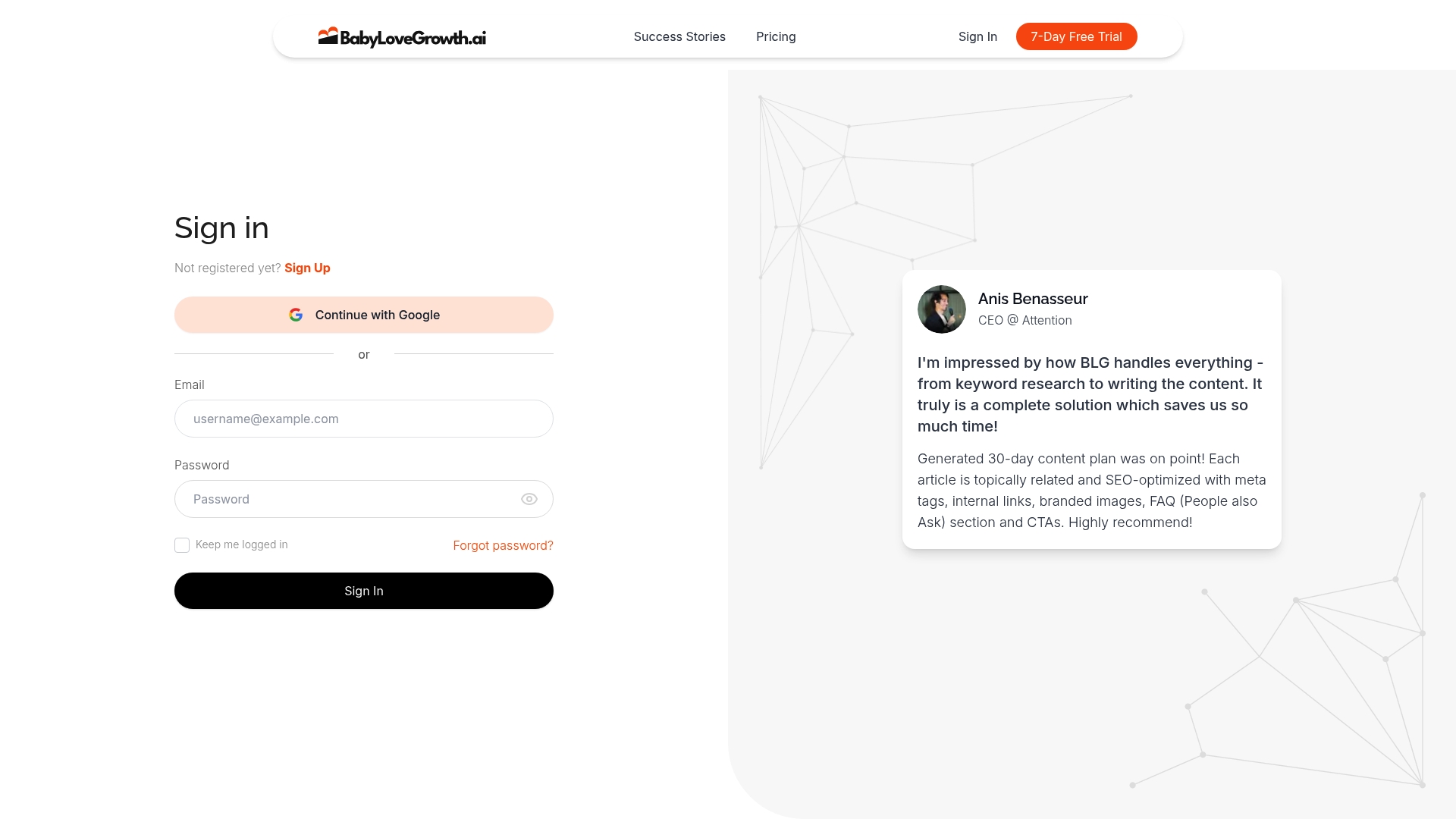
At BabyLoveGrowth.ai, we understand the underlying pain points businesses face in today's digital landscape. Our automated SEO content generation means you don’t have to sacrifice quality for efficiency. With our customized 30-day content planning and in-depth business analysis, we'll help you not only enhance your on-page SEO but also amplify your off-page efforts by creating valuable content that naturally attracts backlinks. Don’t let poor visibility hold you back—take charge of your online presence today!
👉 Transform your SEO strategy now by visiting https://babylovegrowth.ai and unlock the potential of your business!
Recommended Articles
- SEO for Financial Advisors: Boost Your Online Growth
- What Is Topical Authority in SEO? The Ultimate Guide to Boost Your Rankings
- Understanding Nofollow Backlink: What You Need to Know for SEO Success
- Boost Your Business with SEO for Auto Repair Shops: A Practical Guide
- What is a Pillar Page? Understanding Pillar Content and Its Importance in SEO
Smart SEO,
Faster Growth!
Most Read Articles
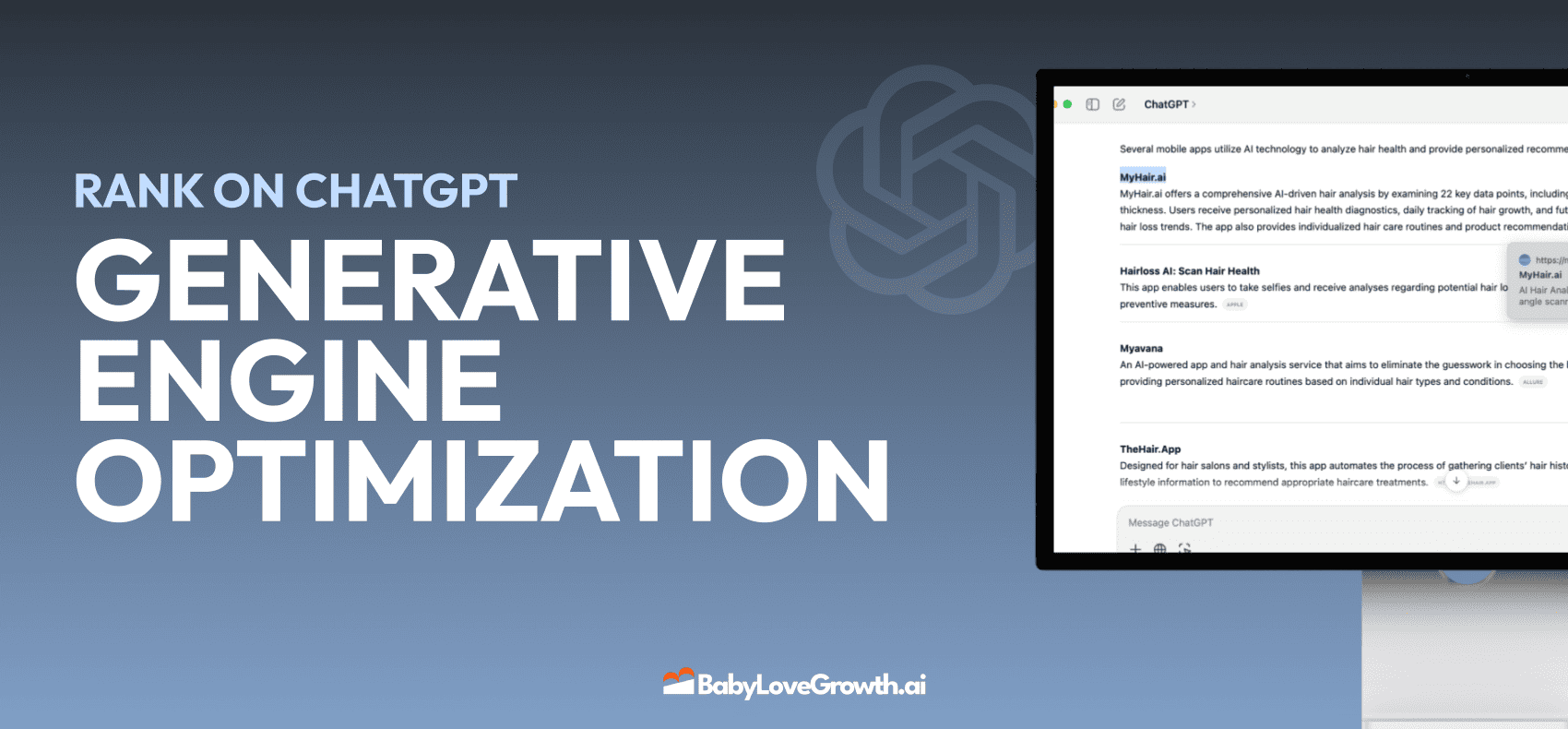
Generative Engine Optimization (GEO)
Learn how Generative Engine Optimization (GEO) helps your content rank in AI search engines like ChatGPT and Google AI. This comprehensive guide explains the differences between SEO and GEO, why it matters for your business, and practical steps to implement GEO strategies for better visibility in AI-generated responses.
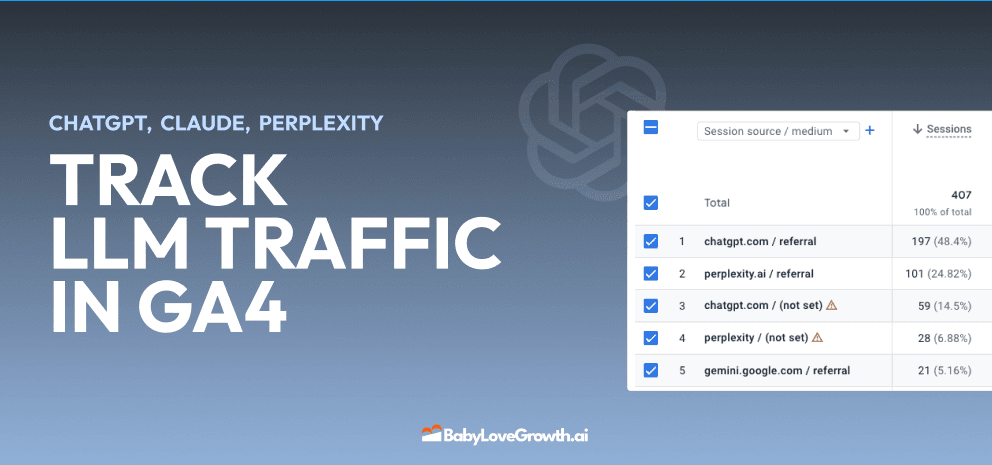
Track LLM Traffic in Google Analytics 4 (GA4)
Learn how to track and analyze traffic from AI sources like ChatGPT, Claude, Perplexity, and Google Gemini in Google Analytics 4. This step-by-step guide shows you how to set up custom filters to monitor AI-driven traffic and make data-driven decisions for your content strategy.
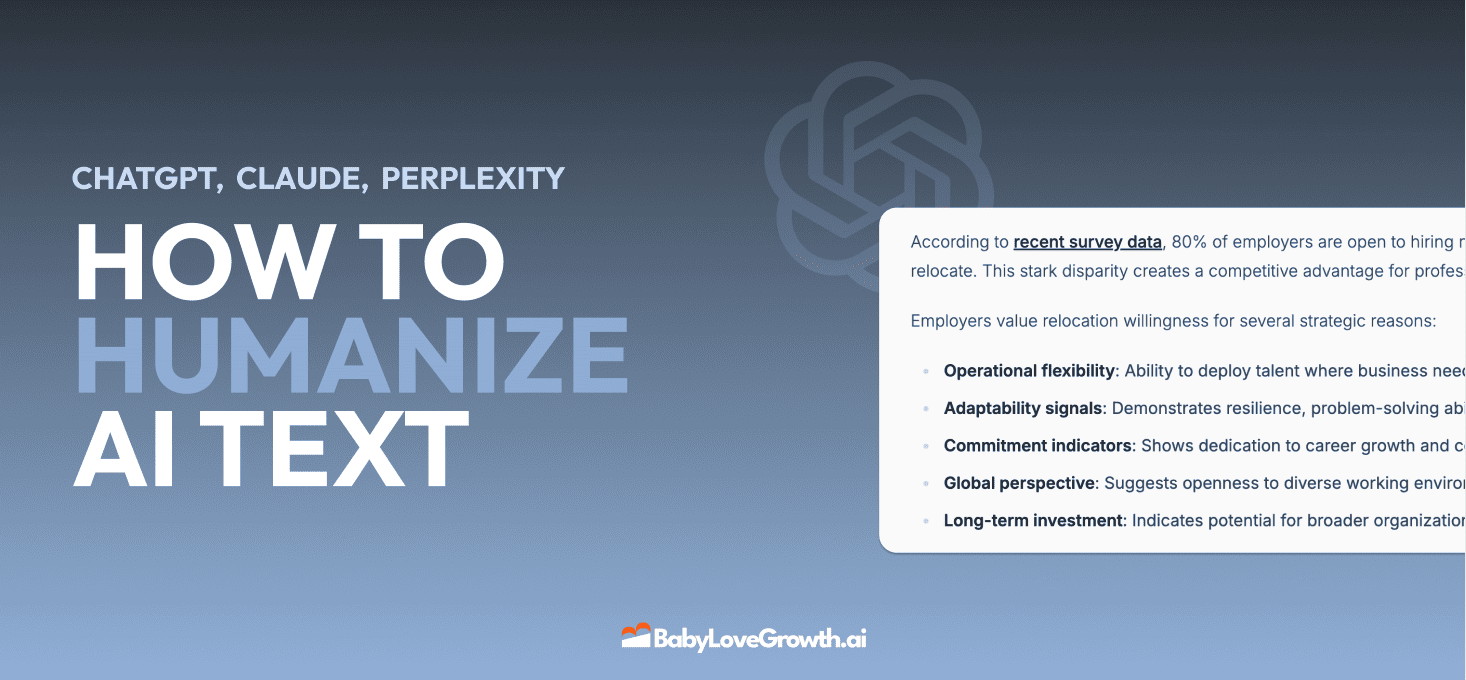
How to Humanize AI Text with Instructions
Learn practical techniques to make AI-generated content sound more natural and human. This guide covers active voice, direct addressing, concise writing, and other proven strategies to transform robotic text into engaging content.
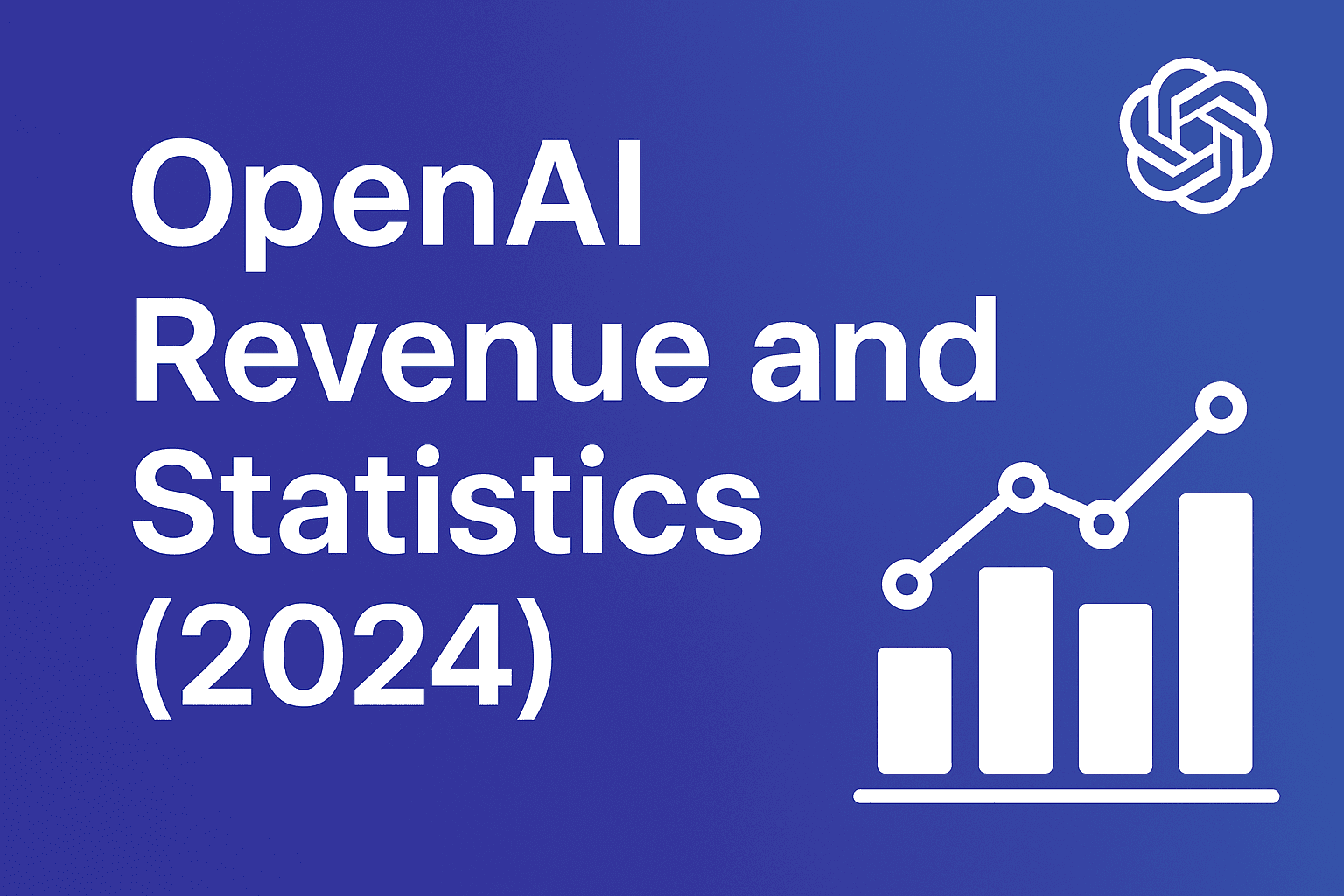
Open AI Revenue and Statistics (2024)
Comprehensive analysis of OpenAI financial performance, user engagement, and market position in 2023. Discover key statistics including $20B valuation, $1B projected revenue, and 100M+ monthly active users.